Plastics Treaty Delayed
Air Date: Week of December 6, 2024
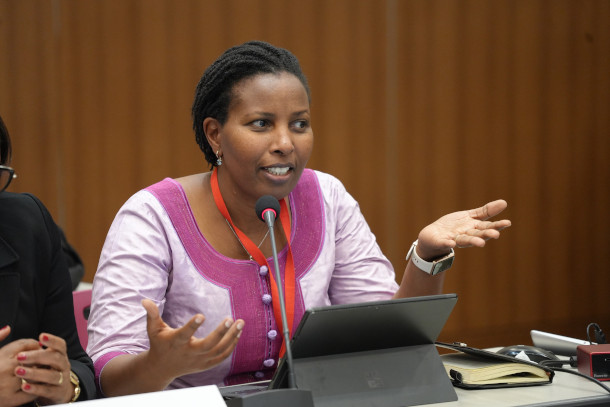
Juliet Kabera, Rwanda’s Director General of the Rwanda Environment Management Authority. ICN-5 in Busan, South Korea, was meant to be the fifth and final negotiation session to create an internationally binding treaty on plastic pollution. No treaty was delivered, and the talks will resume some time in 2025. (Photo: Ministry of Environment, Flickr, CC BY NC-ND 2.0)
Crafting a UN plastic pollution treaty hasn’t been easy, with countries butting heads on key issues including curbs on plastic production, changes of the chemistry of plastics and the role of waste management. Maria Ivanova of Northeastern University has been a delegate or observer at the treaty negotiations since they began and joins Host Steve Curwood to discuss why the recent session in Korea that was supposed to finalize the treaty resulted in only a very rough draft.
Transcript
DOERING: It’s Living on Earth, I’m Jenni Doering.
CURWOOD: And I’m Steve Curwood.
In 2022, the UN General Assembly voted to develop a legally binding international treaty on plastic pollution by 2024. But crafting that treaty hasn’t been easy, with countries butting heads on key issues including curbs on plastic production, changes of the chemistry of plastics and the role of waste management. And what was planned to be the final session of negotiations recently ended in Busan, Korea, with only a “Chair’s Text.” That's a very rough draft to guide delegates when negotiations resume, presumably in mid 2025. Maria Ivanova directs the School of Public Policy and Urban Affairs at Northeastern University and has been a delegate or observer at the treaty negotiations since they began. Welcome back to Living on Earth, Maria!
IVANOVA: Thank you very much.
CURWOOD: Maria, this was supposed to be the fifth and final negotiating session to create a binding international treaty to end plastic pollution. Didn't quite get there. How surprised were people that couldn't get finished?
IVANOVA: People were not surprised, but people were frustrated. We wanted to have an agreement achieved in record time. This would have been record time in two years to achieve agreement on a very ambitious global goal. But there were murmurs that it's too tight, it's too far, too quick. So not many people expected that we will be able to reach a final agreement. Yet most of us hoped that the outlines of an agreement would be agreed upon, but that was not possible.
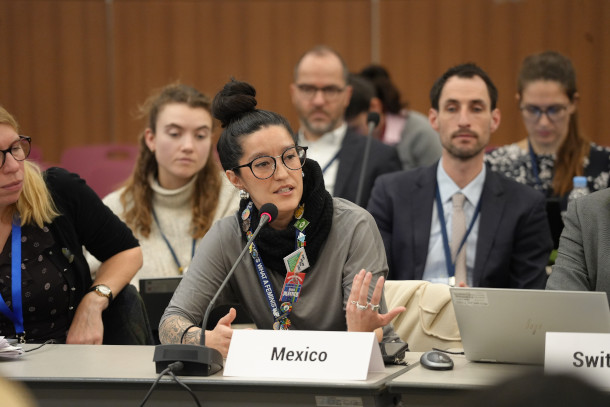
Camila Zepeda, Mexico’s Chief Climate & Biodiversity Negotiator. The “High-Ambition Coalition” of over 100 countries called for curbing plastic production. (Photo: Ministry of Environment, Flickr, CC BY NC-ND 2.0)
CURWOOD: So, talk to me about the major issues of contentions that have to be settled here. What seem to be the biggest sticking points so far in these negotiations?
IVANOVA: It is important to note that everyone, and I mean everyone, agrees that we do have a problem. We have a plastic pollution problem, and the sticking point was, where do we start? Do we start at the beginning of extracting fossil fuels from the ground that can turn into plastics? Do we start at the stage of design, or do we start at the time where we discard those products and improve our waste management systems? This is the key to the contention, is… Where does the life cycle start? And for the high ambition coalition, they said the life cycle starts at the extraction of these fuels from the ground. It starts at the beginning of even getting these resources. While for those countries that said we need a better waste management system, for them, the life cycle starts a bit later.
CURWOOD: Now the countries who are pushing for a better waste management system I would understand, are those countries that produce fossil fuels, the feed stock for plastic, at least a number of them, and I gather that there were a lot of fossil fuel lobbyists at these treaty negotiations. Just how powerful was their presence?
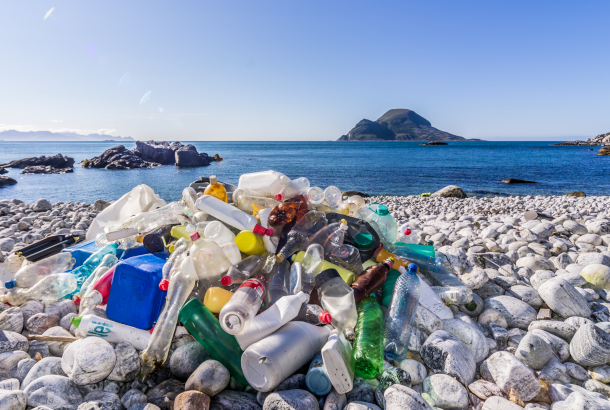
The “Like-Minded Ambition Coalition,” which includes countries like Saudi Arabia and Iran, argued that the treaty should solely focus on waste management. (Photo: Bo Eide, Flickr, CC BY-NC 2.0)
IVANOVA: You could see the presence of fossil fuel lobbyists in all of the spaces. There were also the chemical companies, and importantly, the brands were there. So, on the fossil fuels and the chemicals, the lobbying is for an agreement that does not limit production. On the brand side, and those are Nestle, Coca Cola, Unilever, you have a push for an ambitious treaty, and to me, they were much more visible than the fossil fuel lobbyists. They were much stronger in terms of a message, and much more aligned behind the message for a strong, ambitious plastics treaty, because the brands see that the consumers are changing their behavior.
CURWOOD: So, give me your take on the impasse there. As you say, there are those countries that want to keep pumping out plastics and treat this as a waste management problem. Others want to focus on turning off the tap or limiting production. What's your take on that debate? In other words, your opinion, how should this treaty end up, do you think?
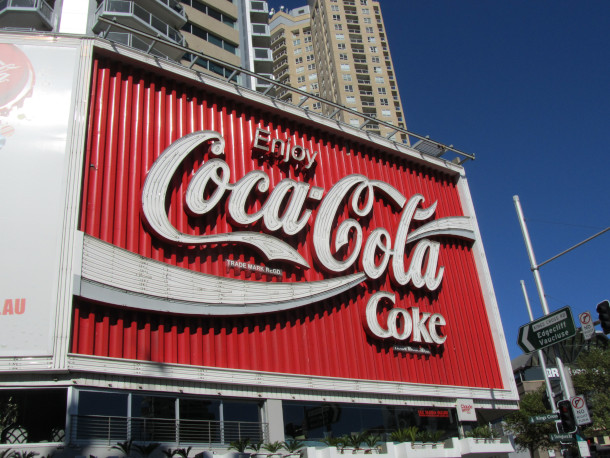
Brands like Coca-Cola and Nestle are calling for an ambitious plastics treaty. Our guest Maria Ivanova suggests this may be because companies recognize shifting consumer preferences. (Photo: Dennis Godegebuure, Flickr, CC BY NC-ND)
IVANOVA: From the beginning, I saw that there were three options on the table. One, a no agreement option. The divergence was too wide, and we could emerge with no agreement. Two, an agreement of the willing, those who wanted to go far and quickly, and there were over 100 countries who wanted to have a global treaty that regulates the entire life cycle of plastics. But then it would not be universal. They would have to go out and have an agreement of the willing, and option three was a consensus pathway to bridge the High Ambition Coalition and the so called "like-minded" group, the oil producing countries that did not want to start at the beginning of extraction life cycle, but to focus on waste. And for that to happen, the high ambition countries needed to give in and eliminate production out of the agreement and start at the design stage. And the like-minded, then would have to agree to have chemicals in the design stage. This could have been a third option that would drive to consensus. In the end, we emerged with option one. There was no agreement. However, the talks have not been canceled. They have been suspended. And so, we will have option two and option three on the table in the future negotiations.
CURWOOD: So, there was this question of eliminating certain chemicals in the plastic production, which, of course, is still not decided. Maria, what are the health concerns with plastic pollution and the chemicals associated with it, for people and wildlife?
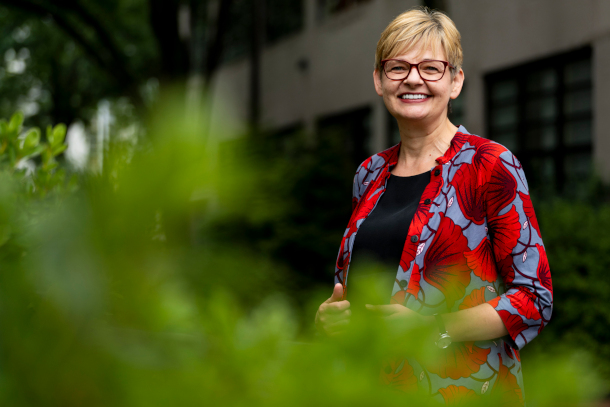
Maria Ivanova is the Director of the School of Public Policy and Urban Affairs at Northeastern University. (Photo: Alyssa Stone/ Northeastern University)
IVANOVA: The health concerns are wide ranging, and they're being discovered more and more with every passing day. Microplastics have now been found in the human body, from the brain to the blood to 100% of testicles tested, human and canine. Plastics have also been found in the deepest ocean, the Mariana Trench, and on Mount Everest. So, plastics are absolutely everywhere in the environment and in our bodies. So, the health effects range from cancers, Alzheimer's disease of microplastics in the brain, or stroke. The endocrine disruptors also are pretty significant, and there is a lot more to be discovered. Of course, you will hear the lobbyists saying, we need more studies, we need more research. And on the other hand, a lot of the scientists will say, we have the research, we know the health effects are significant, we need to do something about it.
CURWOOD: So, so far, no international plastics treaty, with negotiations to resume sometime this coming summer, in 2025. So how do you feel about this? Where are we as a planet in terms of dealing with plastics, from your perspective?
IVANOVA: Yes, no international treaty on plastics yet. But that doesn't mean there is no action on dealing with plastic pollution. The way I feel about this is similar to how I felt about climate when the Trump administration pulled out of the Paris Agreement, and that is, we are still in. This is what businesses wrote and published in the New York Times after the withdrawal of the United States from the climate agreement, and this is what I saw in Busan. Cities and companies are in. What I would like to instigate, to catalyze, is that campuses join that movement. I think if we empower, if we engage, if we catalyze action in cities, in companies and among campuses, we will have the basis not only for a plastics treaty, but for the necessary actions to deal with the plastic pollution problem.
CURWOOD: Maria Ivanova is the Director of the School of Public Policy and Urban Affairs at Northeastern University. Professor, thanks so much for taking the time with us today.
IVANOVA: Thank you very much for having me back, Steve.
Links
Living on Earth wants to hear from you!
Living on Earth
62 Calef Highway, Suite 212
Lee, NH 03861
Telephone: 617-287-4121
E-mail: comments@loe.org
Newsletter [Click here]
Donate to Living on Earth!
Living on Earth is an independent media program and relies entirely on contributions from listeners and institutions supporting public service. Please donate now to preserve an independent environmental voice.
NewsletterLiving on Earth offers a weekly delivery of the show's rundown to your mailbox. Sign up for our newsletter today!
 Sailors For The Sea: Be the change you want to sea.
Sailors For The Sea: Be the change you want to sea.
 The Grantham Foundation for the Protection of the Environment: Committed to protecting and improving the health of the global environment.
The Grantham Foundation for the Protection of the Environment: Committed to protecting and improving the health of the global environment.
 Contribute to Living on Earth and receive, as our gift to you, an archival print of one of Mark Seth Lender's extraordinary wildlife photographs. Follow the link to see Mark's current collection of photographs.
Contribute to Living on Earth and receive, as our gift to you, an archival print of one of Mark Seth Lender's extraordinary wildlife photographs. Follow the link to see Mark's current collection of photographs.
 Buy a signed copy of Mark Seth Lender's book Smeagull the Seagull & support Living on Earth
Buy a signed copy of Mark Seth Lender's book Smeagull the Seagull & support Living on Earth

